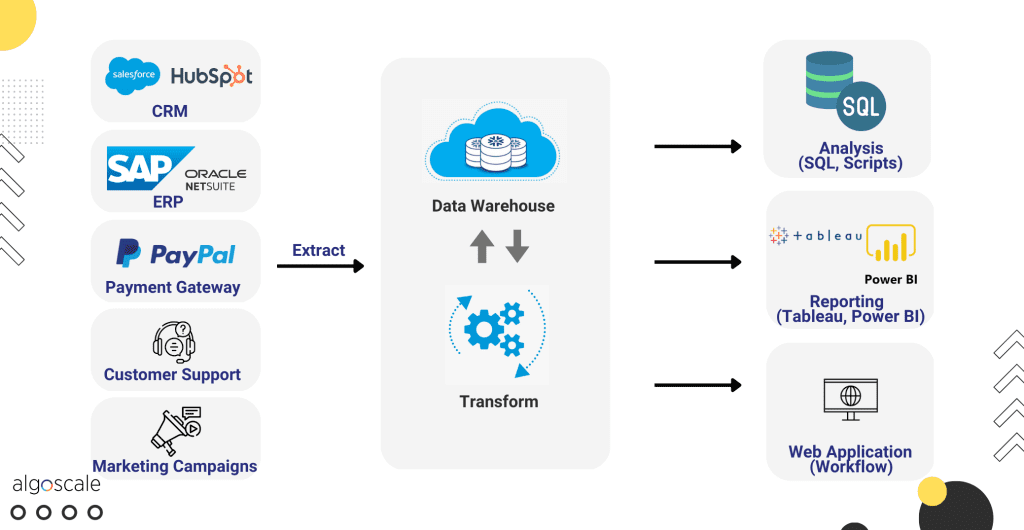In today’s digitally-driven economy, business organizations have more access to data than ever before. This data is a huge corporate asset that builds the foundation of intelligence for crucial business decisions. Adequate use of this data also helps to improve marketing campaigns, optimize business operations, and decrease costs.
However, the sheer volume of data being created has made the process of data management extremely challenging, especially for high-growth start-ups. This lack of proper data management has saddled start-ups with incompatible data silos, unreliable data sets, and poor-quality data, limiting their ability to run BI and analytics applications.
The solution? Setting up a data warehouse.
In today’s blog, we will understand all about data warehouses and how setting those up can help high-growth start-ups to tackle common data management challenges.
About Data Warehouses
A data warehouse is a type of data management solution that centralizes and consolidates data from heterogeneous sources and provides valuable business insights. It serves as the core of a Business Intelligence (BI) solution that is built for data analysis and reporting.
Data warehouses are solely intended to conduct analytical queries and often contain huge amounts of historical data. Because they gather data from multiple sources, they help to build a strong historical record over time that can prove invaluable to business analysts. Using data warehouses, start-up organizations can create a single source of truth, and address their data management challenges.
The Benefits of Setting up a Data Warehouse for High-Growth Start-ups
Start-ups use tons of different software applications, including CRM, ERP, databases, etc. to operate their business smoothly. All these applications produce information that must be properly processed to enhance business intelligence. This is only possible by setting up a data warehouse.

Below are some of the most notable benefits of using a data warehouse for start-ups.
- Enables Historical Insight
In this data-driven world, for every start-up to be successful, they must have an accurate and dependable storehouse of historical data. What if your sales rep wants to analyze the sales trends of a particular product over the last 3 months? This can only happen if your business utilizes a data warehouse that maintains a record of rich historical data.
A data warehouse can also provide the necessary context to any historical data by stating all key performance trends that surround it. Such a level of efficiency can seldom be matched by a legacy database. - Improves Data Conformity and Quality
Every organization generates data from multiple sources in different formats. This includes both structured and unstructured data. A data warehouse converts all this data into a unified and consistent format that can easily be used by data analytical platforms. It ensures conformity and boosts data quality, enabling a more streamlined and efficient feed for analytics. - Boosts Marketing/Sales Campaign Effectiveness
For start-ups, managing sales and marketing data that often gets scattered across different systems is not easy. By the time teams gather the scattered data into spreadsheets to analyze critical metrics, the data may become outdated.
With a data warehouse solution, marketing teams can create a single source of data from which both the sales and marketing teams can operate. Thus, all marketers will have access to the same standardized data, facilitating much faster and more efficient analysis. Teams can also obtain granular insights and track performance metrics such as lead attribution, ROI, and customer acquisition costs. Additionally, marketers can build campaigns around the most recent data to generate better business opportunities. - Generates ROI
For businesses to generate significant revenue gains, it is important to have access to accurate and high-quality data. With a data warehouse solution, high-growth start-ups can organize and manage their bulk data in a structured format. They can then use this data to create strategies that further help them strengthen their operations and realize a better return on investment.
Use Cases
Tactical Reporting
Data warehouses store data that can be used for reporting purposes. Additionally, they are capable of large data streaming where continuous streams of unstructured data are processed and analyzed before it is stored on the disk.
Multiple source systems constantly generate massive volumes of data. With data warehouses, all this data is consolidated to get a global view of the operations and determine how specific factors are impacting different areas. And owing to their speed, businesses no longer have to wait for days or even hours to generate reports.
Several business giants are using data warehouses to consolidate and analyze their business data. Starbucks, for instance, has been using a high-performance enterprise data warehouse to store and process its sales, marketing, supply chain, store management, point of sale, and customer loyalty data. This enables the coffee giant to drive more effective and informed business decisions at the regional, corporate, and store levels.
Data Mining Analytics
Data mining analytics is a process that accumulates and stores huge amounts of data in a single location for quick analysis. It not only helps to get valuable insights into a business’s operations but also serves as an excellent source of competitive intelligence. And data mining is only possible by setting up a data warehouse.
Companies such as Netflix rely on data mining analytics to boost their customer experience. Netflix leverages analytics to show personalized recommendations to the users, find what promotional strategies work best, or even which marketing messages resonate best with the subscribers. All these enable the company to make informed business decisions and keep the users engaged.
Key Considerations for Setting up a Data Warehouse
Now that you have understood how data warehouse analytics can help your start-up, it’s time to discuss the process of setting up one. For that, you need to make one important choice: whether to opt for an on-premises data warehouse or a cloud data warehouse.
An on-premise data warehouse is one in which the business deploys a paid data warehouse system on its own infrastructure. In this case, the business can exercise complete control over its data as it is located close to the source. Such solutions have very little dependence on third-party cloud data. Also, there is less issue of network latency. However, developing and implementing an on-premise system requires a lot of resources and effort.
A cloud-based data warehouse, on the other hand, is located in the cloud. In this case, the business organization does not have to deploy or maintain a data warehouse at all. All the development part is taken care of by some third-party cloud service provider. One of the greatest benefits of opting for a cloud-based data warehouse is that it is very easy to scale. The business can scale up or down its data requirements, thereby ensuring much-needed flexibility to start-ups that have limited budgets.
Apart from this, there are a few other considerations that you must keep in mind while setting up a data warehouse, including:
- Your precise business requirements
- Type of data to be stored
- Architecture consideration
- Choice of ETL tools
- Support for BI tools
- Ongoing storage costs and maintenance
Click here to read more about Building A Scalable Data Warehouse.
Examples of successful implementation of data warehouse in high-growth start-ups
At Algoscale, we helped our client develop a data warehouse for a leading conversational messaging platform. The client’s carrier-grade platform provided a single messaging API for over 30 channels to deliver highly conversational experiences powered by AI. For this purpose, several chatbots are deployed that gather a huge amount of data that must be used to deliver meaningful insights. With over 9 billion messages sent every month, the client’s platform had data coming in from multiple sources such as log files, S3, MySQL, etc.
The client wanted a robust data warehouse solution to leverage all the data generated from the bot chat sessions and derive insights.
The experts at Algoscale created a data warehouse solution using the Amazon Redshift cluster. We used Amazon Redshift Serverless to run and scale analytics without the need for managing data warehouse clusters. The bot data was imported from S3 to Redshift using an automated data pipeline that runs every 1 minute and replicates the new S3 files to Redshift. Furthermore, we also created a Python script that runs on Kubernetes.
Our customized solution enabled the client to derive invaluable insights on over 6 billion messages per month. Regardless of the complexity level of the query, our solution analyses thousands of parallelized nodes to generate quick responses and transforms all unstructured data into an easily comprehensible form.
Click here to read more.
Conclusion
Start-up organizations must capture the complete potential of their data to scale their revenue. By setting up a data warehouse, these start-ups will be better equipped to manage dynamic market conditions and fulfill evolving customer requirements. They will also be able to centralize all their business data and transform it into a consistent format.
At Algoscale, we can help you turn your start-up business into a powerhouse of growth by streamlining your data requirements. Whether it is building a new warehouse or upgrading an existing one, our team of experts can help. We ensure robust data security and customized protections by leveraging various encryptions to safeguard your company’s confidential data.
Schedule a consultation with our data architects to know more.












